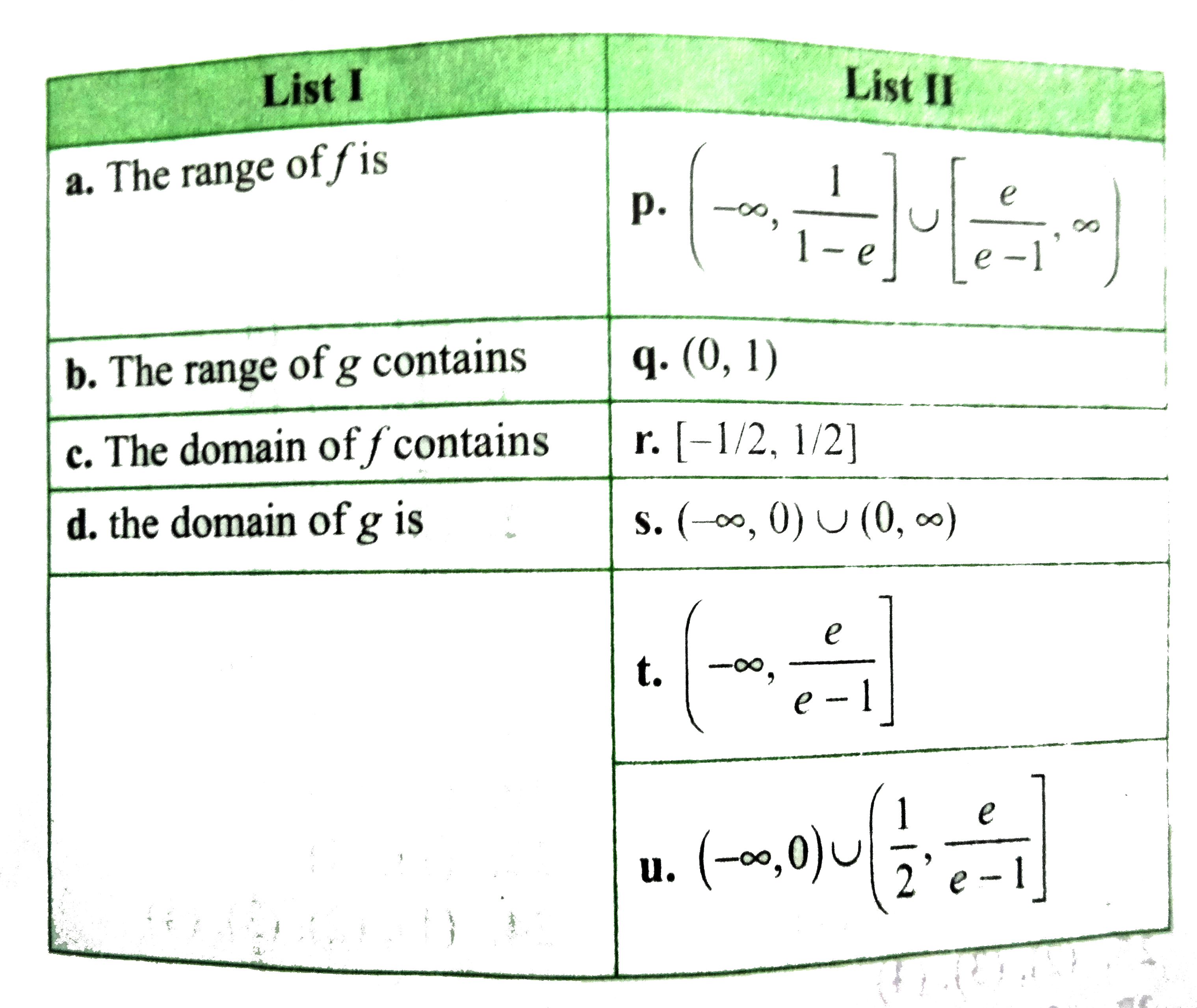Let E1={x∈R:x≠1andxx−1>0}andE2={x∈E1:sin−1(loge(xx−1)) is real number}
(Here, the inverse trigonometric function sin−1x assumes values in [−π2,π2].)
Let f:E1→R be the function defined by f(x)=loge(xx−1)andg:E2→R be the function defined by g(x)=sin−1(loge(xx−1)).

The correct option is
a→s,b→q,c→p,d→p
a→r,b→r,c→u,d→t
a→s,b→q,c→p,d→u
a→s,b→r,c→u,d→t
The correct Answer is:A
E1:xx−1>0
⇒x∈(−∞,0)∪(1,∞)
Also E2:−1<loge(xx−1)≤1
⇒1e≤xx−1≤e
⇒1e≤1+1x−1≤e
⇒1e−1≤1x−1≤e−1
⇒(x−1)∈(−∞,e1−e]∪[1e−1,∞)
⇒x∈(−∞,e1−e]∪[1e−1,∞)
Now, xx−1∈(0,∞)−{1}∀x∈E1
⇒loge(xx−1)∈(−∞,∞)−{0}
⇒sin−1(loge(xx−1))∈[−π2,π2]−{0}
(considering loge(xx−1)∈[−1,1]−{0})
Topper's Solved these Questions
- RELATIONS AND FUNCTIONSBOOK - CENGAGECHAPTER - RELATIONS AND FUNCTIONSEXERCISE - Solved Examples And Exercises
498 Videos
- RELATIONS AND FUNCTIONSBOOK - CENGAGECHAPTER - RELATIONS AND FUNCTIONSEXERCISE - Exercise (Numerical)
31 Videos
- Quadratic Equations, Inequalities, Modulus and LogarithmsBOOK - CENGAGECHAPTER - Quadratic Equations, Inequalities, Modulus and LogarithmsEXERCISE - Question Bank
31 Videos
- SCALER TRIPLE PRODUCTS BOOK - CENGAGECHAPTER - SCALER TRIPLE PRODUCTS EXERCISE - DPP 2.3
11 Videos
Similar Questions
Let E1={x∈R:x≠1 and xx−1>0} and E2={x∈E1:sin−1((log)e(xx−1)) is a real number} . Here, the inverse trigonometric function sin−1x assumes values in [π2,π2] Let f:E1→R be the function defined by f(x)=(log)e(xx−1) and g:E2→R be the function defined by g(x)=sin−1((log)e(xx−1)) LIST-I LIST-II P. The range of f is 1. (−∞,11−e]∪[ee−1,∞) Q. The range of g contains 2. (0,1) R. The domain of f contains 3. [12,12] S. The domain of g is 4. (−∞,0)∪(0,∞) 5. (−∞,ee−1] 6. (−∞,0)∪(12,ee−1] The correct option is: P→4;→2;R→1;S→1 (b) P→3;Q→3;R→6;S→5 (c) P→4;Q→2;R→1;S→6 (d) P→4;Q→3;R→6;S→5
View Solutionlet f:R→R be a continuous function defined by f(x)=1ex+2e−x
View Solution
Knowledge Check
The domain of the function f(x)=sin−1log3(x3)) is
A[1,9]B[−1,9]C[−9,1]D[−9,−1]The domain of the function f(x)=sin−1(3−x)loge(|x|−2), is
A[2,4]B(2,3)∪(3,4]C[2,3)D(−∞,−3)∪[2,∞)Let f:(−1,∞)→R be defined by f(0)=1 and f(x)=1xloge(1+x),x≠0. Then the function f:
Aincreases in (–1,∞)Bdecreases in (–1,0) and increases in (0,∞)Cincreases in (–1,0) and decreases in (0,∞)Ddecreases in (−1,∞).
The domain of the function f(x)=sin−1(3−x)loge(|−x|−2), is
View SolutionThe function f(x)=cos−1(|x|−32)+(loge(4−x))−1 is defined for
View SolutionThe function f:R+→(1,e) defined by f(x)=x2+ex2+1 is
View Solutionf(x)=logex,g(x)=1logxe . Identical function or not?
View Solutionf(x)=logex,g(x)=1logxe . Identical function or not?
View Solution
